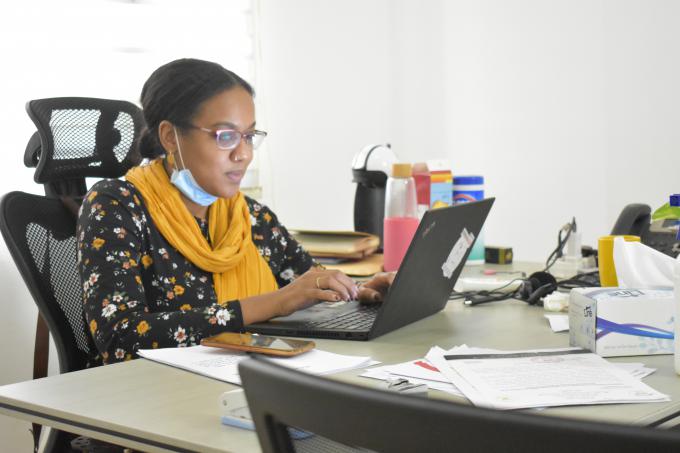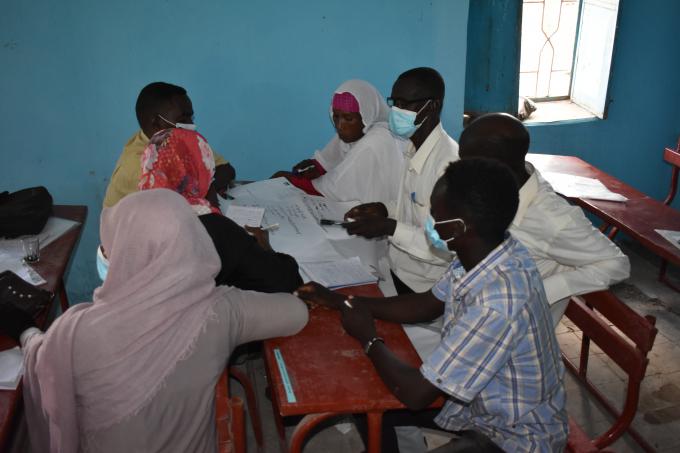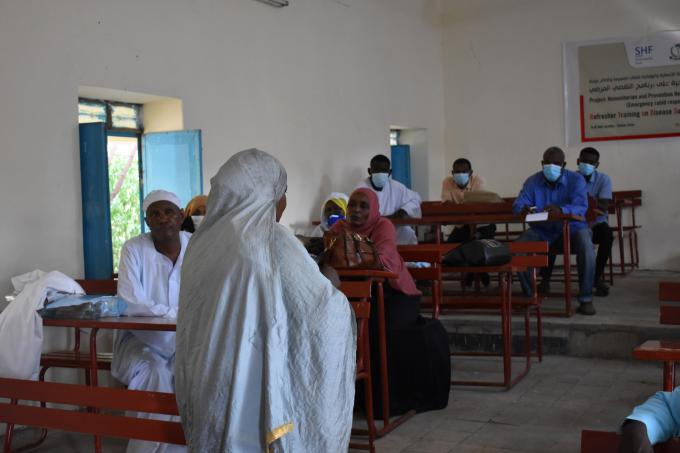POLITICAL CHANGE, POLITICAL UNREST: SAVE THE CHILDREN IN SUDAN PERSISTS
In the early hours of October 25th, the Transitional Military Council took measures against the civilian cabinet of the Transitional Government of Sudan. Arresting several ministers and the Prime Minister Abdallah Hamdok, Sudan experienced and faced a major political change in government leading to social and political unrest.
A nationwide state of emergency was announced. Communications were disrupted. Freedom of mobility was restricted.
Citizens responded to this change with street barricades, civil disobedience, and protests that captured the world's attention, yet again.
From the first day, Save the Children staff responded by recognizing that humanitarian work must go on. Whether it was a roadblock, bank strike, or network shutdown, nothing managed to stop these dedicated humanitarians from operating in their respective areas.
They continued to work with the safety and wellbeing of Sudanese children as the drive to maintaining their activities, and finding ways to remain operational despite the highly volatile situation that has engulfed the nation.
Here, we share stories of perseverance and unwavering commitment to Save the Children's mission in Sudan.
NO MOBILITY, NO MOBILES
A common practice of protest in Sudan is the establishment of street barricades, which serve the purpose of protection, rejection of political events or decisions, and the initiation of a civil strike. On the morning of October 25th, almost every main street across the three capital cities was barricaded.
In the case of Khalid Abaker, driver for Save the Children International’s Sudan Country Office, it was nearly impossible to make it to the office that morning – but he knew there would be urgent tasks at the office, and that Save the Children did not have the option of pausing their mission.
“I wouldn't say the situation necessarily stopped us from doing our jobs,” Abaker said. “But it definitely made things more stressful because most staff were unable to come to office.”
Taking several detours through smaller roads with his motorcycle, he was able to reach the office. At the time that he arrived, he was the only driver who was able to make it.
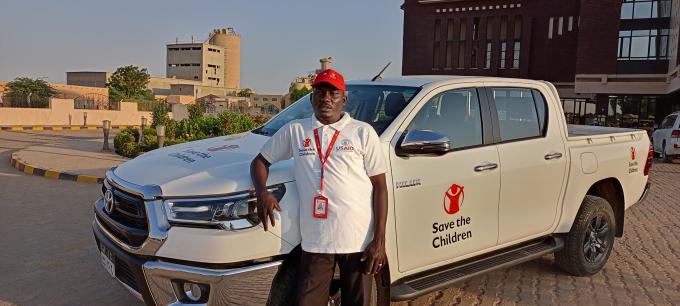
The disconnection of phone lines and mobile data for most of the first day, and on-and-off for the following weeks only complicated the job. “Connectivity was also a major setback, we spent the entire first day calling frantically, hoping any one phone call would miraculously go through. In the evening of the 25th, some calls started going through.” Abaker stated. “When connections resumed, my line manager tasked me to be on standby at the Khartoum Office.”
Throughout the first two weeks following October 25th, Abaker and one other driver divided the tasks that would normally be assigned to eight drivers. “I became responsible for everything regarding transportation, whether it was making sure a staff member makes it to the office safely, or something needs to be delivered from point A to point B,” he recounted.
Staff who were residing in guesthouses had to be relocated to hotels, due to protests being faced with tear gas, loud gunfire, and live ammunition, which prevented them from leaving their residences on their own. “It meant they were unable to buy food, drinking water, or any of the essentials that would sustain them until the situation calmed down,” Abaker explained. “It was very risky working during this time, and on many occasions, we were late because a trip that would normally take one hour now took three hours to complete.”
Khalid, while completely understanding the risks, he ensured that himself, and staff at Save the Children in Sudan were secure and safe and able to serve children across Sudan. “Despite all of this, we continued with our determination to do our work,” expressed Abaker. “We are doing it for the benefit of the children.”
COMMUNICATION IS KEY
On the first day, the Head of Advocacy, Communications, Campaigns and Media, Samreen Abuidris, made it to work. Although she lives close by, she still struggled to navigate the roads. “My biggest challenge was that we had no connection and no certainty, and when you get out you cannot even imagine what can happen,” Abuidris acknowledged. “I came in to see if everyone is okay, and I also needed access to the internet to debrief people outside the country, and to see if there is something that should happen.”
Abuidris says that working in advocacy and communications means being at the frontline – whether working with the press to represent the organization’s point of view, or working with government entities during a governmental change. “In my point of view, we are one of the most affected – if not the most affected – with the political instability,” she asserted.
“It is a big challenge for us to learn to work in a new environment, and the biggest challenge facing us right now is in how to express ourselves in a way that does not harm the reputation of our organization and its employees.”
Challenges can stand in the way, but priorities stand higher. Abuidris emphasizes that staff’s wellbeing is integral to maintaining the continuity of activities and reaching the goals the department and Save the Children has set for this time.
“My main priority right now is to ensure work carries on, and to provide children with the help they need during this situation. Because the urgency of these needs will increase with political changes,” she said.
“There are a lot of children we promised; we are going to fulfil all their needs in any situation. Save the Children will continue to offer help for all the kids and families the support.”
COVID-19 RESPONSE IS UNNEGOTIABLE
In the capital city, Save the Children in Sudan supports Khartoum and Jabra COVID-19 Isolation Centres (ICs). With these centres – especially Khartoum – located in areas that were extremely tense, it was vital for Save the Children’s health team response to be relevant and rational.
In the beginning, it was not easy to go to the isolation centres. There was a lack of communication between Save the Children’s staff and the ICs medical and nonmedical personnel due to the network and lack of transportation. It became apparent after some time that IC staff were unable to go to the centres.
“There were a lot of challenges. With medical staff, specifically, those who were finished with their shifts were unable to go home, and those who were supposed to start their shift, were stuck at home,” Dr. Mohieldin Hassan, Isolation Centre Coordinator at Save the Children, explained. “But they were truly committed doctors and nurses. They stayed, and doubled their shifts, and covered for colleagues who were unable to come in. There was a lot of collaborative teamwork that was a result of their responsibility for their job and the patients.”
On the following day, Save the Children’s health team created gathering points to transport the staff to the ICs. They decided the best way to do so was through ambulance vehicles. In addition, they coordinated with on-call staff who lived close to the ICs to come in immediately if another colleague’s commute was hindered for any reasons.
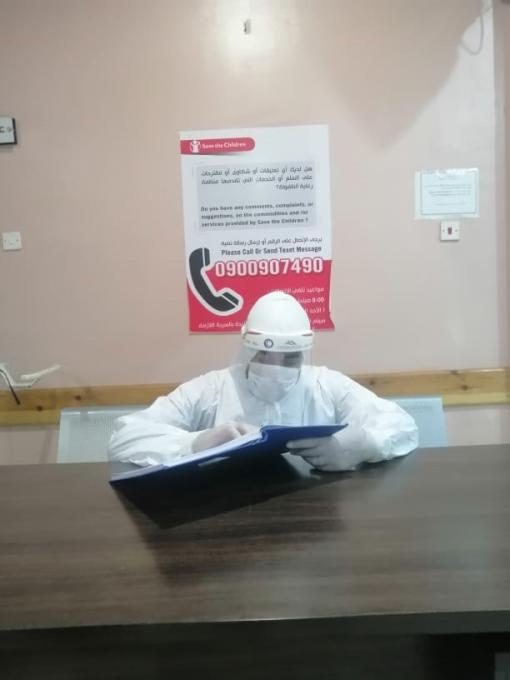

Typically, ICs receive new oxygen cylinders every eight hours day after day, or have the oxygen tank at the hospital refilled. The 25th happened to be the day scheduled for oxygen supply – bringing oxygen on time was a matter of life or death.
“After receiving the oxygen from the suppliers, we had to make sure it is transferred as soon as possible,” said Dr. Hassan. “We decided the best way to go about it was sending the trucks carrying the oxygen with ambulance vehicles ahead of them, and workers that will help in removing some of the barricades on some streets leading to the Jabra Isolation Centre.”
At the same time, another basic need was becoming a challenge within ICs buildings: food. With stores and restaurants shutting down, staff and patients were low on food supply. “With physical, mental and psychological exhaustion, especially for medical staff, it was necessary for them to be provided with proper meals at least twice a day,” expressed Hassan. Luckily, the health team, with the support of the Country Director, were able to deliver meals for staff and patients that would sustain them for two days until accessibility to food items became more available.
With Sudan experiencing yet another COVID-19 wave, cases are on the rise and more patients need immediate treatment. For patients to be admitted to the ICs, they need to be referred from Primary Isolation Centres. Lack of communication, online referral system shutdown, as well as immobility, created a congestion in the number of patients at the primary centres whose cases were both critical and severe. Again, Save the Children’s health team stepped in and ensured the transfer of the patients accordingly with ambulance vehicles.
“Once phone calls resumed, the situation became easier and we were able to divide tasks better,” Dr. Hassan assured. “But it must be said that efforts were being exerted to the maximum since the beginning.”
Dr. Hassan highlights that Save the Children’s role in COVID-19 response in Sudan has been remarkable – and nationally recognized – since the beginning of the pandemic, and it cannot stop now. He adds that the organization of teamwork from all persons involved – who know the danger of interrupted services at the ICs – made the job more manageable.
“There are challenges in all emergencies. But the sustainability of the service we provide is unnegotiable,” he concludes. “We must be patient, committed, and remember that children, and people, rely on us. Humanitarian support is not about day-to-day tasks – it’s about lives. It’s about saving lives.”
OBSTACLES OUTSIDE OF KHARTOUM
Mohamed Fedail, Head of Implementation Program Manager in the Sennar Field Office tells a slightly different story on what has been happening outside of Khartoum starting October 25th.
“The first day was a bit difficult due to the tension since the roads were closed by barricades and the protesters were occupying the streets, but most of our staff were already in office by the time the roads closed,” Fedail describes.
Refresher medical training held by Save the Children’s Sennar team post-October 25th
“We held a meeting and told our staff if anyone does not feel comfortable working, they can leave out of consideration for their families who may be worried about them. Everyone stayed.”
Since Save the Children’s projects are mostly outside of Khartoum, the Sennar Office had more obstacles in accessing government offices and ministries which were not operational.
In the next two days, all staff were present and decided to resume field work.
“On the third day phone networks were back and the first thing we did was check on the medical facilities we were supporting throughout the state,” began Fedail. “We found they all remained running during the communication blackout, and since the areas in which they operate in are not densely populated, the 13 facilities were mostly unaffected besides not being able to contact us or vice versa.”
In addition, the Sennar Office was able to distribute hygiene NFI (nonfood items) to 1,500 households in Al Soug and Dinder. The following week, 40 mobile clinics were running, reaching 24 villages in 10 days and providing up to 18,000 people with treatments.
This would not have been possible without the Country Office decentralizing the command hierarchy and allowing autonomy to zonal managers to act during this crisis. “If we were dependent on the country office for all of our operations, we wouldn't have been able to do our jobs since Khartoum was the most affected,” Fedail affirmed.
“The freedom to determine a plan of action on our own, and not worrying about being fired or having pressure to do our jobs a certain way allowed us the flexibility to adapt to the situation and continue our operations as normally as possible. We all agreed that as humanitarian workers, our work should continue with neutrality regardless of our individual political leanings.”
 Sudan
Sudan 